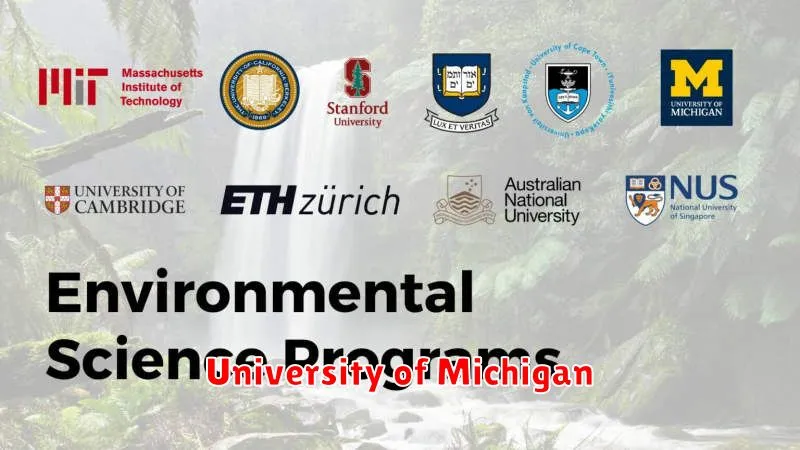Are you passionate about the environment and seeking a top-tier education in environmental science? Choosing the right university is a crucial step towards a successful career in this vital field. This article explores the 10 best universities for studying environmental sciences, highlighting their strong programs, renowned faculty, and cutting-edge research opportunities. Whether you’re interested in conservation, sustainability, climate change, or other related areas, this guide will help you find the perfect institution to cultivate your passion and develop the skills needed to address the world’s most pressing environmental challenges.
Navigating the numerous university options can be daunting. That’s why we’ve compiled this comprehensive list of the 10 best universities for studying environmental sciences. We’ll delve into each university’s unique strengths, from specialized research centers to experiential learning programs. This guide empowers you to make an informed decision, aligning your academic aspirations with the best environmental science programs available. Discover the institutions that will equip you with the knowledge and expertise to become a leader in environmental science and contribute to a more sustainable future.
Stanford University

Located in the heart of Silicon Valley, Stanford University offers a multidisciplinary approach to environmental science. Its proximity to innovative companies and organizations provides unparalleled opportunities for research and collaboration.
The School of Earth, Energy & Environmental Sciences houses numerous departments relevant to the field, including the Department of Earth System Science and the Department of Civil and Environmental Engineering. Students can pursue various specializations, from energy resources engineering to sustainable design and construction.
Stanford’s strong emphasis on practical application and problem-solving makes it an ideal choice for students seeking to address real-world environmental challenges. The university’s renowned faculty and state-of-the-art facilities further enhance the learning experience.
University of California, Berkeley

The University of California, Berkeley (UC Berkeley) offers a renowned environmental science program, consistently ranking among the top in the world. Its location in the Bay Area provides unique access to diverse ecosystems for research and fieldwork.
Key strengths include its interdisciplinary approach, combining natural sciences, social sciences, and policy. Students can specialize in areas such as environmental economics, conservation biology, and energy resources.
UC Berkeley’s faculty boasts leading experts in various environmental fields, contributing groundbreaking research and influencing policy decisions. The campus is also a hub for environmental activism and innovation.
Harvard University

Harvard University, located in Cambridge, Massachusetts, offers a robust and interdisciplinary approach to environmental sciences. Its strength lies in its diverse faculty and research opportunities across various schools, including the Harvard John A. Paulson School of Engineering and Applied Sciences and the Harvard T.H. Chan School of Public Health.
Students can pursue a variety of programs, from undergraduate concentrations in Environmental Science and Public Policy to graduate degrees in fields like Environmental Health and Sustainable Development. Research initiatives focus on critical areas such as climate change, biodiversity loss, and pollution control.
Harvard’s extensive resources, including its renowned libraries and museums, provide students with unparalleled access to information and scholarly materials. The university’s commitment to solving complex environmental challenges makes it a top choice for aspiring environmental scientists.
University of Cambridge

The University of Cambridge consistently ranks among the top universities globally and holds a prominent position for environmental sciences. Its Department of Geography offers various programs focusing on understanding and addressing environmental challenges.
Key Strengths include its interdisciplinary approach, combining natural and social sciences, and its world-renowned research facilities. Students benefit from a rich intellectual environment and opportunities for fieldwork and collaboration with leading experts.
Popular Programs include the MPhil in Environmental Policy and the PhD in Geography. Research areas cover diverse topics such as climate change, biodiversity conservation, and sustainable development.
University of Oxford

The University of Oxford consistently ranks among the top universities globally and holds a prominent position for Environmental Sciences. Its interdisciplinary approach offers students a broad perspective on environmental challenges.
The School of Geography and the Environment is a key hub for environmental research and teaching, covering areas such as biodiversity, climate change, and sustainable development. Students benefit from world-class facilities and access to leading researchers in their fields.
Oxford’s rigorous academic programs emphasize critical thinking and independent research, preparing graduates for influential roles in addressing environmental issues.
ETH Zurich

ETH Zurich, or the Swiss Federal Institute of Technology Zurich, consistently ranks among the top universities globally and holds a particularly strong reputation for its environmental science programs. Its interdisciplinary approach connects various departments, fostering collaboration and innovation.
Students benefit from state-of-the-art facilities and research opportunities, contributing to advancements in areas like climate change, renewable energy, and sustainable resource management. The focus on practical application and research makes ETH Zurich an excellent choice for students seeking to make a tangible impact in the field of environmental science.
Yale University

Yale University, located in New Haven, Connecticut, offers a renowned program in environmental studies. The Yale School of the Environment (YSE) provides interdisciplinary opportunities, fostering collaboration and critical thinking.
Students can pursue a range of degrees, including a Master of Environmental Management, a Master of Forestry, and a PhD in Environmental Studies. YSE focuses on research-driven solutions to complex environmental challenges, emphasizing policy, science, and management.
The program’s strength lies in its distinguished faculty and access to resources, including the Yale Peabody Museum of Natural History and the Yale Forests.
University of Michigan

The University of Michigan’s School for Environment and Sustainability (SEAS) offers a multidisciplinary approach to environmental science. Students can specialize in areas like environmental justice, conservation ecology, and sustainable systems.
SEAS emphasizes hands-on learning and research opportunities. Students are encouraged to engage in real-world projects and collaborate with faculty on cutting-edge research. The program’s focus on problem-solving and critical thinking prepares graduates for diverse careers in the environmental field.
Imperial College London

Imperial College London stands as a global leader in science and engineering, offering a rigorous and research-intensive environment for studying environmental sciences. Its location in central London provides unparalleled access to world-leading organizations and resources.
The College’s Department of Civil and Environmental Engineering, along with its Centre for Environmental Policy, conducts cutting-edge research focusing on critical areas such as climate change, sustainable energy, and water resource management. Students benefit from access to state-of-the-art facilities and close collaboration with renowned experts in their fields.
University of British Columbia

The University of British Columbia (UBC) is a global leader in environmental sciences, offering a diverse range of programs at both the undergraduate and graduate levels. Located in Vancouver, Canada, UBC benefits from its proximity to diverse ecosystems, providing unique research opportunities.
Key strengths include its interdisciplinary approach, connecting environmental science with fields such as law, policy, and economics. UBC boasts world-renowned faculty actively engaged in cutting-edge research, tackling pressing environmental challenges. Students benefit from state-of-the-art facilities and access to exceptional field study experiences.

